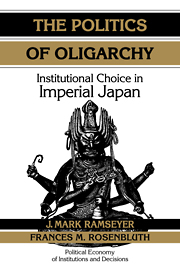Crossref Citations
This Book has been
cited by the following publications. This list is generated based on data provided by Crossref.
Feeny, David
and
Siamwalla, Ammar
1998.
The Institutional Foundations of East Asian Economic Development.
p.
413.
Katzner, Donald W.
1999.
Western Economics and the Economy of Japan.
Journal of Post Keynesian Economics,
Vol. 21,
Issue. 3,
p.
503.
Miwa, Yoshiro
and
Ramseyer, J. Mark Mark
1999.
Corporate Governance in Transitional Economies: Lessons from the Pre-War Japanese Cotton Textile Industry.
SSRN Electronic Journal ,
Miwa, Yoshiro
and
Ramseyer, J. Mark Mark
2000.
Banks and Economic Growth: Implications from Japanese History.
SSRN Electronic Journal,
Fabbrini, Sergio
2000.
Political Change without Institutional Transformation: What Can We Learn from the Italian Crisis of the 1990s?.
International Political Science Review,
Vol. 21,
Issue. 2,
p.
173.
2000.
Sources of Chinese Economic Growth, 1978-1996.
p.
iv.
2000.
Sources of Chinese Economic Growth, 1978-1996.
p.
v.
2000.
Sources of Chinese Economic Growth, 1978-1996.
p.
ix.
Miwa, Yoshiro
and
Ramseyer, J. Mark Mark
2001.
Property Rights and Indigenous Tradition Among Early 20th Century Japanese Firms.
SSRN Electronic Journal,
LUST-OKAR, ELLEN
and
JAMAL, AMANEY AHMAD
2002.
Rulers and Rules.
Comparative Political Studies,
Vol. 35,
Issue. 3,
p.
337.
Rasmusen, Eric Bennett
and
Ramseyer, J. Mark Mark
2002.
When are Judges and Bureaucrats Left Independent? Theory and History from Imperial Japan, Postwar Japan, and the United States.
SSRN Electronic Journal ,
Miwa, Yoshiro
and
Ramseyer, J. Mark
2002.
Banks and Economic Growth: Implications from Japanese History.
The Journal of Law and Economics,
Vol. 45,
Issue. 1,
p.
127.
Acemoglu, Daron
2003.
The Form of Property Rights: Oligarchic vs. Democratic Societies.
SSRN Electronic Journal ,
Sonin, Konstantin
2003.
Why the Rich May Favor Poor Protection of Property Rights.
SSRN Electronic Journal ,
Kreuzer, Marcus
2003.
Parliamentarization and the Question of German Exceptionalism: 1867–1918.
Central European History,
Vol. 36,
Issue. 3,
p.
327.
Cullen, L. M.
2003.
A History of Japan, 1582–1941.
Carney, Richard W.
2004.
National Security and National Finance: Locating the Origins of Modern Financial Capitalism.
SSRN Electronic Journal,
Ramseyer, J. Mark
2004.
Convergence and Persistence in Corporate Governance.
p.
348.
Sonin, K.
2005.
Institutional Theory of Endless Redistribution.
Voprosy Ekonomiki,
p.
4.
Leach, Darcy K.
2005.
The Iron Law of What Again? Conceptualizing Oligarchy Across Organizational Forms.
Sociological Theory,
Vol. 23,
Issue. 3,
p.
312.



